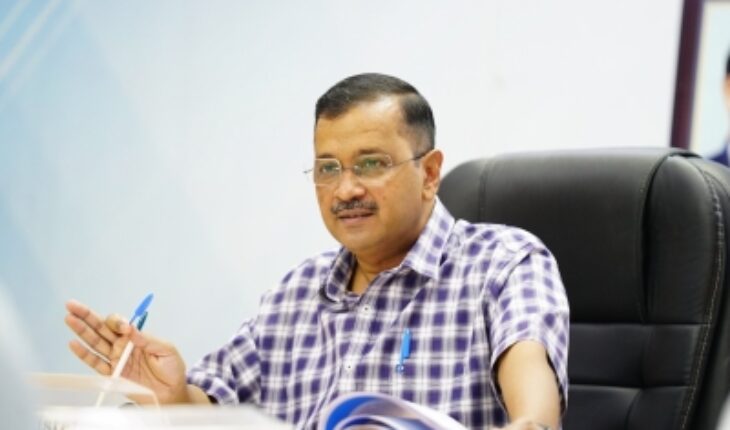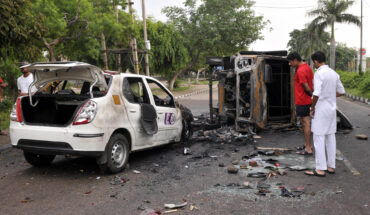New Delhi : In a unanimous verdict, the Supreme Court resolved the longstanding power dispute between the Arvind Kejriwal-led Delhi government and the central government regarding the control and transfer of bureaucrats serving the Government of National Capital Territory of Delhi (GNCTD). The court ruled that the GNCTD has control over bureaucrats, except in matters of police, public order, and land.
A five-judge constitution bench, led by Chief Justice DY Chandrachud, has asserted that an elected government must have authority over bureaucrats. The bench noted that the Union Territory of Delhi has a unique character and rejected Justice Ashok Bhushan’s 2019 ruling that the Delhi government has no control over services.
”Further expansion of the Union’s power will be contrary to the Constitutional scheme…Delhi is similar to other states and has a representative form of government,” the top court said in its verdict over the contentious issue of administrative control over services between the Centre and the Delhi government.
”The National Capital Territory of Delhi government has legislative and executive powers over services sans…public order, police and land,” said the bench, which also comprised Justices M R Shah, Krishna Murari, Hima Kohli and P S Narasimha.
Hailing the SC verdict, AAP chief and Delhi chief minister Arvind Kejriwal termed the order a ”victory of democracy” and his party said it was a ”tight slap” on the mission to topple state governments across the country.
Kejriwal also expressed his ”heartfelt thanks” to the Supreme Court for ”doing justice to the people of Delhi” and said the pace of development will increase manifold.
AAP Rajya Sabha Raghav Chadha called the verdict a ”landmark decision” and said it sends a stern message.
”Satyamev Jayate. Delhi wins. Hon’ble Supreme Court’s landmark judgment sends a stern message that officers working with the government of Delhi are meant to serve (the) people of Delhi through the elected government and not unelected usurpers parachuted by Centre to stall governance, namely LG,” Chadha tweeted.
Holding that the primacy of the Centre in administrative issues would abrogate the federal system and the principle of representative democracy, the bench said if ‘services’ are excluded from the legislative and executive domain, then ministers would be excluded from controlling civil servants.
Democracy and federalism are part of the basic structure of the Constitution, the CJI said while reading out the judgement in a packed courtroom.
The order also said if officers stop reporting to ministers then the principle of collective responsibility is affected, adding that in a democratic form of governance, the real power of administration must rest on the elected arm of government.
The court also made it clear that the Lieutenant Governor is ”bound by the aid and advice” of the Delhi government ministers in relation to matters within the legislative scope of the city government. The bench said the Union government’s power in matters where both the Centre and States can legislate is limited to ensure that the governance is not taken over by the Central government.
Elaborating on the Delhi government’s powers, the court said legislative and executive power over services such as Indian Administrative Services, or Joint Cadre services, which are relevant for the implementation of policies and vision of the Delhi government in terms of the day-to-day administration of the region shall lie with it. The Constitution bench was set up to hear the legal issue concerning the scope of legislative and executive powers of the Centre and the National Capital Territory government over control of services in Delhi after the Union home ministry issued a notification in 2015, stating that it has control over services in Delhi. The notification was challenged by the Arvind Kejriwal government in the Delhi high court.
The SC bench had reserved its order on January 18 after hearing the submissions of Solicitor General Tushar Mehta and senior advocate A M Singhvi for the Centre and the Delhi government respectively for almost four-and-a-half days.
On May 6 last year, the top court referred the issue of control of services in Delhi to a five-judge Constitution bench.
The plea moved by the Delhi government arises out of a split verdict of February 14, 2019, in which a two-judge bench of Justices A K Sikri and Ashok Bhushan, both now retired, had recommended to the CJI that a three-judge bench be set up to finally decide the issue of control of services in the national capital.
Justice Bhushan had ruled that the Delhi government had no power at all over administrative services, while Justice Sikri had made a distinction.
He had said the transfer or posting of officers in the top echelons of the bureaucracy (joint director and above) can only be done by the Centre and the lieutenant governor’s view will prevail in case of a difference of opinion on matters related to other bureaucrats.
In a 2018 judgment, a five-judge Constitution bench had unanimously held that the Delhi LG was bound by the aid and advice of the elected government, and both needed to work harmoniously with each other.





